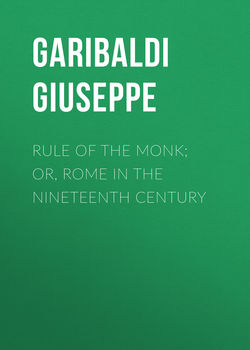Читать книгу Rule of the Monk; Or, Rome in the Nineteenth Century - Garibaldi Giuseppe - Страница 24
PART THE FIRST
CHAPTER XXIII. THE LIBERATOR
ОглавлениеClelia's liberator, who had arrived so opportunely on the scene of violence, was by no means a giant, being not more than an inch or two above the ordinary height; but the erectness of his person, the amplitude of his chest, and the squareness of his shoulders, showed him to be a man of extraordinary strength.
As soon as this opportune hero who had come to the rescue of the weak, had stricken down the chief by a blow of his gun-butt upon the robber's skull, he levelled the barrel at the brigand who held Manlio in his grasp and shot him dead. Then, without waiting long to see the effect of his bullet – for this hunter of the wild boar had a sure eye – he turned to the direction pointed out by Clelia. She was still much agitated; but when she perceived her champion so far successful, she cried-
"Avanti! go after Julia, and rescue her. Oh, go!"
With the fleetness of the deer the young man sped away in pursuit of Julia's ravishers, and, to Clelia's instant relief, the English girl soon reappeared with their preserver; Julia's captors having taken to flight upon hearing the shots.
Reloading his gun, the stranger handed it to Manlio, and proceeded to appropriate to his own use those arms which he found upon the dead bodies of the brigands.
They then returned to the carriage, and found the horses grazing contentedly on the young grass that bordered the road. For a little while no one found a voice. They stood absorbed in thoughts of joy, agitation, and gratitude; the women regarding the figure of the stranger with fervent admiration. How beautiful is valor, particularly when shown in the defense of honor and loveliness in woman, whose appreciation of courage is a deep instinct of her nature. Be a lover bold and fearless, as well as spotless, a despiser of death, as well as graceful in life, and you will not fail to win both praise and love from beauty.
This sympathy of the fair sex with lofty qualities in the sex of action has been the chief promoter of human civilization and social happiness.
For woman's love alone man has gradually put aside his masculine coarseness, and contempt for outward appearances, becoming docile, refined, and elegant, while his rougher virtue of courage was softened into chivalry.
So far from being his "inferior," woman was appointed the instructress of man, and designed by the Creator to mould and educate his moral nature.
We have said our fair travellers gazed with admiration at the fine person of the brigand – for "brigand" we must unwillingly confess their deliverer to be – and as they gazed, the younger members of the party, it may be acknowledged, imported into their glance a little more gratitude than the absent lovers, Attilio and Muzio, would perhaps have wished. But admiration gave place to surprise, when the brigand, taking Silvia's hand, kissed it, with tears, saying-
"You do not remember me, Signora? Look at my left eye: had it not been for your maternal care, the accident to it would have cost me my life."
"Orazio! Orazio!" cried the matron, embracing him. "Yes, it is indeed the son of my old friend."
"Yes, I am Orazio, whom you received in a dying condition, and nursed back to life; the poor orphan whom you nourished and fed when left in absolute need," he replied, as he returned her embrace tenderly.
After exchanging these words of recognition, and receiving others of ardent gratitude from the party, Orazio explained how he had been hunting in the neighborhood, when he saw the attack, and came to do what he could for the ladies. He advised Manlio to put them into the carriage again, and depart with all speed; "for," said he, "two of these bandits have escaped, and may possibly return with several of their band." Then, ascertaining the name of the port from which they intended sailing, he offered to become their charioteer, and, mounting the box, drove off rapidly in the direction of Porto d'Anzo.
Arrived there without further adventure, the freshness of the sea air seemed to put new life and spirits into our jaded travellers, and the effect upon the beautiful Julia in particular was perfectly marvellous. A daughter of the Queen of the Ocean, she, like almost all her children, was enamored of the sea, and pined for it when at a distance.
The sons of Britain scent the salt air wherever they live; they are islanders with the ocean always near. They can understand the feeling of Xenophon's 1000 Greeks, when they again beheld the ocean after their long and dangerous Anabasis, and how they fell upon their knees, with joyful shouts of "Thalassa! Thalassa!" and saluted the green and silver Amphitrite as their mother, friend, and tutelary divinity.
